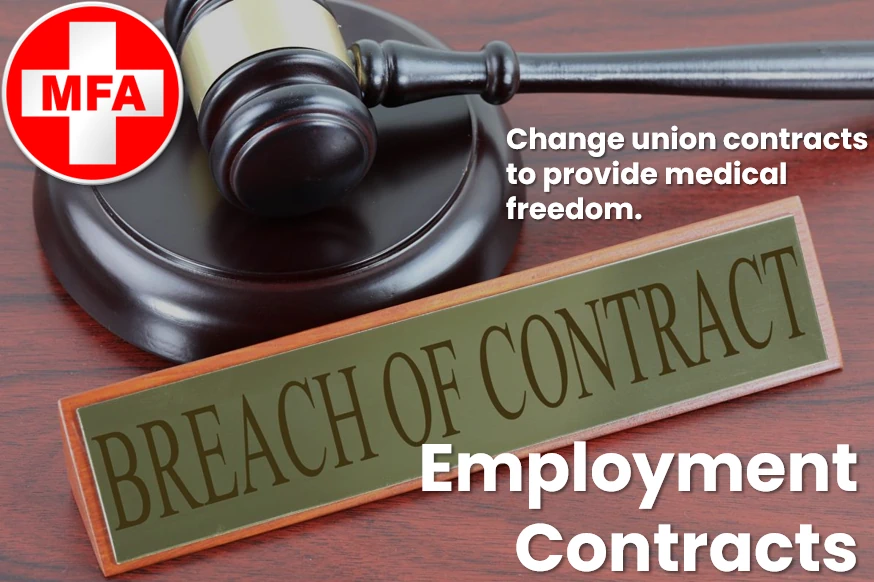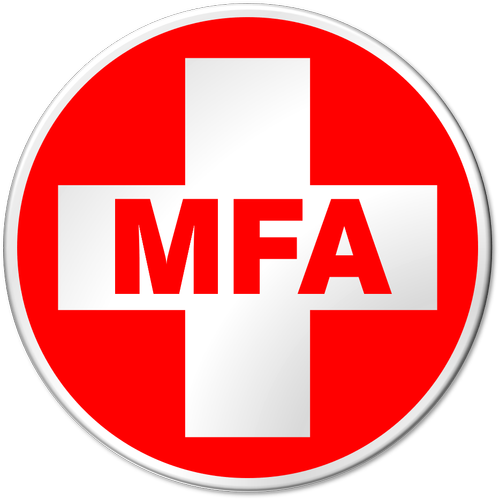
Medical Freedom is accomplished through a variety of different methods. Ideally, all levels are exercised. No one level of protection guarantees complete medical freedom.
- Non-compliance. If someone tells you to do something, you simply do not comply. The more people who don’t comply, the better. It will force the oppressor to use violence, which is self-defeating for them.
- Changing the laws. This is the most sustainable, long-term, universal solution to medical freedom because it constrains government and corporations. This is the purpose of Medical Freedom Act., to change the laws at the State and Federal level to constrain Government and Corporations.
- Political change. Voting for the right people who support freedom and liberty is important. However, this is never a long term solution because politicians are always replaced. A good politician may choose not to enforce a bad law, or even write executive orders, but both of these are temporary.
- Contract law. This is a contract between two parties, enforceable in court or through a grievance process (unionized workers under the Railway Labor Act). Contrary to union management belief, literally anything can be written into a contract as long as it does not violate the laws of the land. Nothing stops unions from writing an employment contract that absolutely restricts a company from requiring medical procedures.

Do This
Write to your labor union management and demand that the 7 Key Points of Medical Freedom be written immediately into your contract either through a new contract, Letter of Agreement (LOA), Memorandum of Understanding (MOU), or some other contract vehicle. Note: it’s vital that LOAs and MOUs get written into the contract.
7 Key Points of Employment Medical Freedom
- The company shall never require any medical procedure, product, or treatment as a requisite of continued employment or hiring. Any lawful nation-state requiring a medical procedure, product, or treatment shall be accomplished exclusively through voluntary employee compliance, free of undue influence or retribution. Medical procedures, products, or treatments includes testing.
- With no exception, the company shall have no access to a pilot’s medical records either directly or through a proxy (e.g. company doctor). If an FAA aerospace medicine doctor clears a pilot to hold a FAA Class 1 or 2 medical license, the pilot is considered medically qualified and the company shall not further discriminate on any medical basis
- The company shall be prohibited from engaging in any medical product advertising, education, or propaganda, or otherwise advocate for any medical procedure, product, or treatment.
- For lawful government medical requirements, the company shall, without protest, honor any religious or medical exemptions without coercion, undue influence or burden to the pilot, and without segregation from the general pilot population for said exemption.
- If a lawful government medical qualification exists for which a pilot refuses, without the need for reason, to meet that requirement, the company shall offer alternative pairings available to all pilots normally which avoids such restrictions (e.g. domestic pairings). A pilot may not be involuntarily downgraded in seat position to meet these requirements, but a pilot may, without coercion, elect to downgrade but that pilot’s pay scale shall remain that of his previous seat position corrected for time in service and all other normal pay scalars (e.g. night pay, emergency pay, etc.).
- Penalties. For any period of time for which the company violates any aforementioned section, the company shall pay the pilot the daily equivalent of the minimum company daily average guarantee within 1 payment cycle for any amount of time the pilot is denied the ability to work. This applies for each day of contractual violation or each day of denied work ability. Accommodating pairing re-assignments may not include unequal treatment as to provide a dis-incentive or punishment for a pilot exercising his medical freedom rights.
- Any pilot who is the subject of a medical violation of any aforementioned article shall be re-imbursed any legal fees a pilot may accrue if he elects personally acquired legal representation outside of ALPA legal representation. The pilot shall have full authority to choose a legal team, firm, or lawyer of his choice. The legal fee shall be paid by the company to the pilot no later than 30 days after the pilot provides a personally written invoice to the company. The pilot shall ensure the personally written invoice to the company reflects an identical cost to the costs incurred by the law firm and related legal costs. The company shall have the right to audit any original expenses after the case is settled and after any appeals or ongoing litigation between the two parties is finalized. The pilot or any third party shall not reveal to the company the names of any law firms or related legal services used in litigation, unless the pilot’s law firm or servicer agrees it is necessary for a legal function. The company shall make no attempt to identify or learn the identity of any pilot acquired legal representation or related legal services.
Feel free to modify and adapt these to your job position. Check here often for updates to this in case others have suggested a change that mutually benefits everyone. Items in blue are a quick reference to a word that should be changed for a different occupation (e.g. pilot).
Suggestions, Improvements, Feedback, Critiques?
Nothing is perfect so if you have any suggestions on how to improve the key points, we’re all ears.
